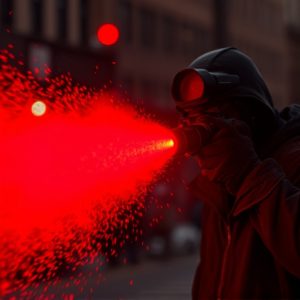Decoding Eye Irritation from Pepper Spray Exposure: Protective Measures and First Aid Insights
Pepper spray can cause severe eye irritation that leads to temporary blindness due to its active in…….
Pepper spray can cause severe eye irritation that leads to temporary blindness due to its active ingredient, oleoresin capsicum. The intense burning sensation and uncontrollable eye closure result from the chemical's interaction with the eyes' trigeminal nerve endings. This reaction causes tears and blinking, which can create a temporary blindness lasting from minutes to hours. Pre-existing eye conditions may worsen the situation, potentially causing more severe harm. Protective eyewear is essential for safeguarding against such effects when dealing with pepper spray in scenarios like self-defense or law enforcement. In the event of exposure, immediate action is crucial: remove the affected person to a safe environment and rinse their eyes with a saline solution for at least 20 minutes before seeking medical assistance. Over-the-counter treatments can alleviate symptoms but are no substitute for professional care. Understanding the potential impact of pepper spray on vision and health is critical, as it underscores the importance of responsible handling to prevent accidental exposure and its consequent effects.
Eye irritation can arise from various sources, with pepper spray being a potent agent capable of causing significant ocular distress. This article delves into the mechanisms behind pepper spray’s intense effects, addressing concerns such as whether it can permanently impair vision or lead to temporary blindness. Understanding the nature of eye irritation upon exposure to pepper spray is crucial for recognizing protective measures and administering first aid effectively. By examining these aspects, we aim to provide clarity on the impact of pepper spray and how to cope with its effects safely.
Understanding Eye Irritation and Pepper Spray Exposure
Eye irritation from pepper spray exposure is a serious concern that requires immediate attention. Pepper spray, commonly used as a self-defense mechanism or crowd control agent, contains oleoresin capsicum, which induces intense irritation upon contact with the eyes. The effects are not limited to temporary discomfort; they can significantly impair vision, causing sufferers to experience a burning sensation, involuntary eye closure, and an inability to keep the eyes open due to the extreme pain. In some instances, the spray can lead to a temporary blindness where the victim is unable to see for varying lengths of time, ranging from minutes to hours. It’s crucial to understand that while vision may return after exposure, the experience can be traumatic and debilitating. Additionally, individuals with pre-existing eye conditions may face more severe consequences. Protective eyewear can provide a barrier against the spray, potentially reducing the impact of the irritant and mitigating some of these effects. Proper handling and storage of pepper spray are essential to prevent accidental exposure that could lead to unintended injury or harm.
The Mechanism Behind Pepper Spray's Intense Irritation Effects
Pepper spray, a form of non-lethal chemical mace, is renowned for its potent irritant effects. Upon deployment, it emits a capsaicinoid-laden cloud that targets the eyes with extreme efficiency. The substance binds to the trigeminal nerve endings in the mucous membranes of the eyes, triggering an overwhelming sensation of pain and discomfort. This mechanism is similar to how capsaicin in hot peppers causes burning sensations upon contact with skin or mucous membranes. The eyes attempt to flush out the irritant by reflexively tearing and blinking, which can lead to temporary blindness as the lacrimal glands produce an excess of tears. The intensity of the eye irritation is a result of the compound’s direct impact on the body’s pain receptors, causing inflammation and swelling that obscure vision, making it difficult to see and potentially leading to temporary blindness under extreme conditions. The effects are not limited to the eyes; pepper spray can also affect the respiratory system if inhaled, leading to coughing and difficulty breathing. Understanding the mechanism behind these effects is crucial for both law enforcement and individuals using pepper spray as a means of self-defense, as well as for medical personnel treating affected individuals. It’s important to handle pepper spray responsibly due to its profound impact on sensory organs and overall well-being.
Protective Measures and First Aid for Pepper Spray Incidents
Eye irritation due to pepper spray can be a serious concern, potentially leading to temporary blindness if not addressed promptly and properly. In the event of exposure to pepper spray, immediate action is crucial to alleviate discomfort and protect vision. The first step in protective measures involves wearing protective eyewear when in situations where pepper spray might be used, such as self-defense scenarios or law enforcement operations. Safety goggles designed to shield against chemical irritants are particularly effective. In the unfortunate event that exposure occurs, first aid protocol should be initiated without delay. The affected individual should be moved to a safe environment away from further contamination. Eyes should not be splashed with water as this can push the spray further into the eye; instead, they should be flushed with a gentle stream of room-temperature saline solution for at least 20 minutes. This helps to dilute and remove the spray. Subsequently, medical attention should be sought as soon as possible since professional care is necessary to prevent complications. Over-the-counter antihistamine and analgesic medications can help manage symptoms post-incident, but they do not negate the need for prompt medical evaluation and treatment. It’s important to understand that the severity of eye irritation from pepper spray can vary based on factors such as the concentration of the spray and the duration of exposure, so immediate response is key in mitigating the impact.


